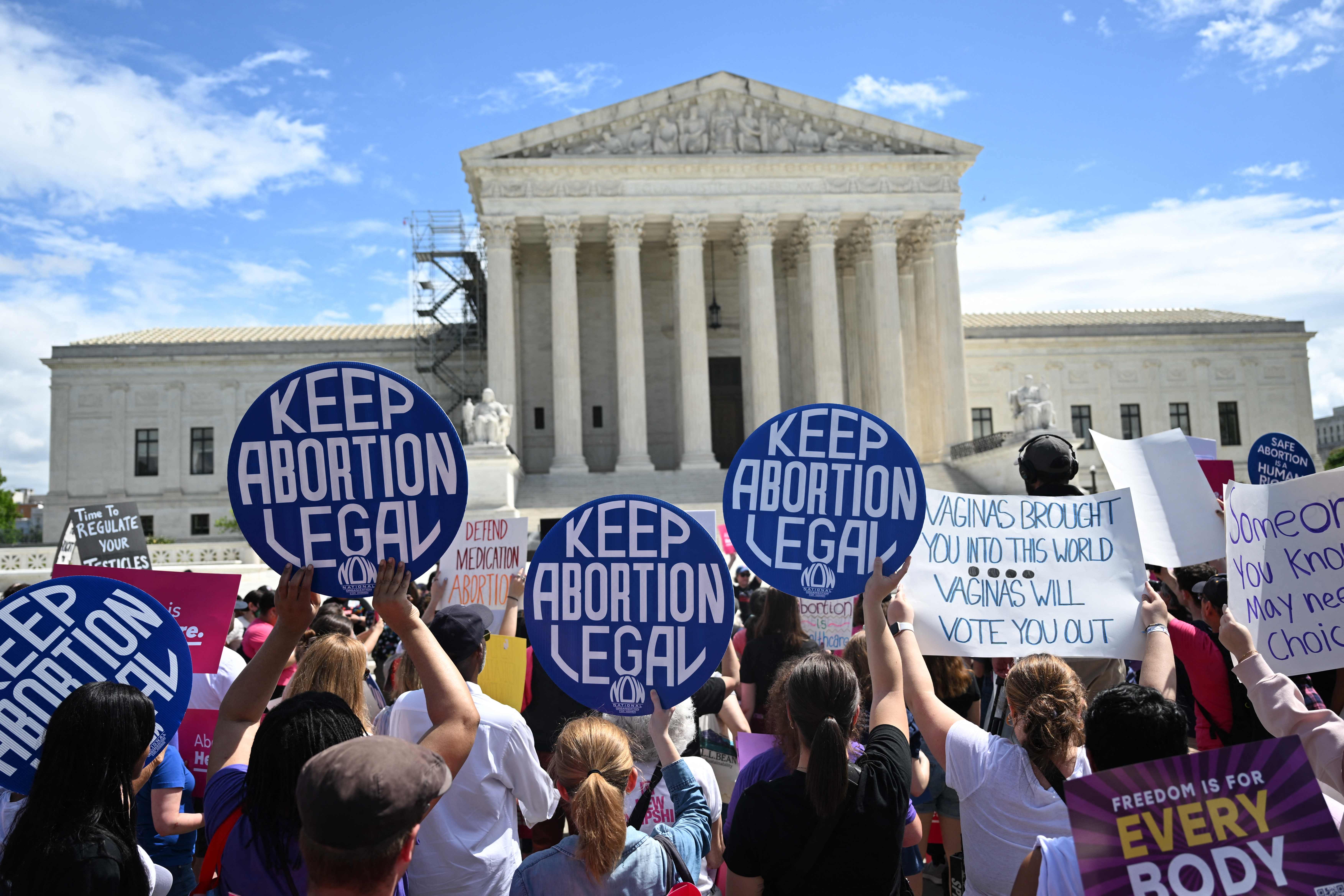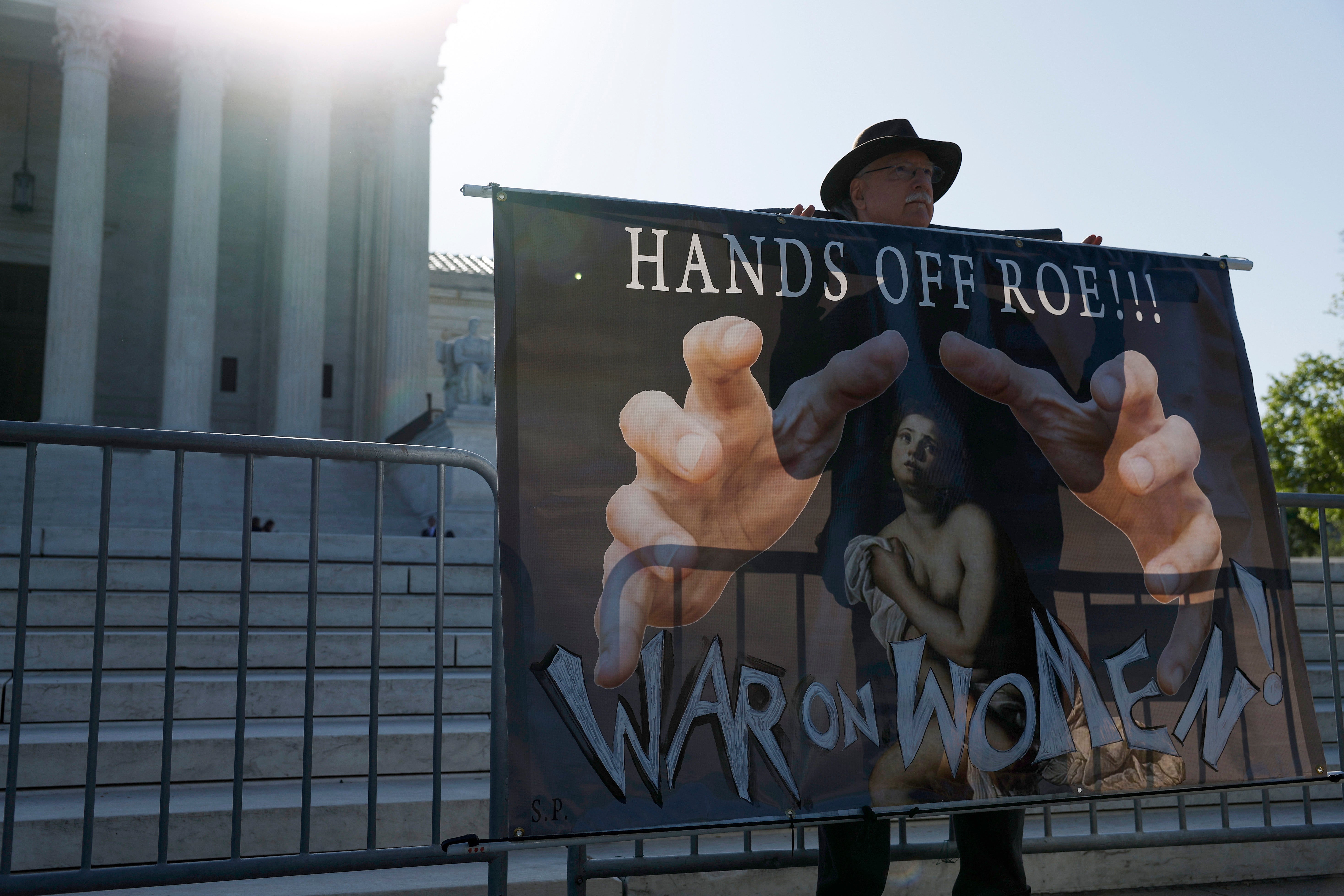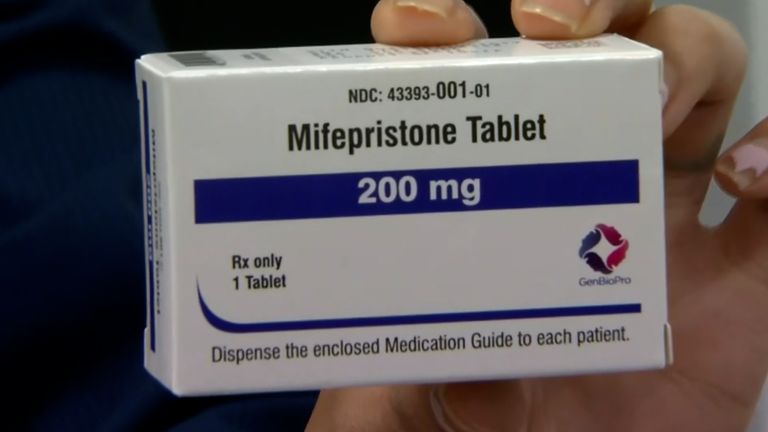
The US Supreme Court has kept the government’s approval of a widely used abortion drug in place, while one of the biggest battles over abortion rights since the end of Roe v Wadecontinues in federal courts.
Justices on the nation’s highest court have paused a lower court ruling that challenge the government’s 23-year-old approval of mifepristone, part of a two-drug protocol for medication abortion, the most common form of abortion in the US.
Following an appeal from the Biden administration and drugmakers, the court paused a federal judge’s ruling that would strip the US Food and Drug Administration’s approval of mifepristone, which was first approved by the government agency in 2000.
A ruling to strike down the FDA’s approval of the drug would have drastically impacted access to abortion and miscarriage care for millions of Americans across the country, including in states where it is legally protected.
Who is Matthew Kacsmaryk, the Trump-appointed judge trying to ban abortion drug?
A Trump-appointed federal judge in Texas whose decision to halt approval of the most commonly used abortion drug in the US has trigged a legal battle posing the most significant threat to abortion rights since the Supreme Court revoked a constitutional right to abortion care last year.
The latest: Supreme Court delays decision in abortion drug case until Friday
The US Supreme Court has extended its pause on a lower court ruling that would strip the government’s approval of a widely used abortion drug, which will remain available, at least for now.
An order from the nation’s highest court that put the ruling on hold was set to lapse at midnight on Wednesday. An order issued on Wednesday afternoon extended that hold until midnight on Friday.
Abortion advocates and providers brace for Supreme Court decision in major drug case
Abortion providers, clinics and abortion rights advocates and patients are anticipating a US Supreme Court decision that could provide some clarity about the fate of a widely used drug at the centre of the biggest legal battle for abortion care since the fall of Roe v Wade last year.
Advocates and civil rights legal groups were stunned by lower court rulings that took aim at the FDA’s approval of mifepristone, decisions that they say are “unmoored” by both the law and science, including decades of research and guidance from major medical and public health organisations.
How the challenge to mifepristone landed at the Supreme Court
Following the Supreme Court’s decision to overturn Roe v Wade last year, marking a significant victory for the anti-abortion movement and Christian conservative legal groups who have fuelled that campaign, anti-abortion activists took aim at medication abortion, the most common form of abortion care in the US.
Here’s how the case played out over the last several months:
- In November, the group Alliance Defending Freedom filed a lawsuit in US District Court in Amarillo, Texas on behalf of a group of anti-abortion activists incorporated at the Alliance for Hippocratic Medicine, which was organised that month with an address in Amarillo.
- Judge Matthew Kacsmaryk – a former right-wing activist lawyer who was appointed to the federal judiciary by Donald Trump – held a hearing in the case on 15 March in Amarillo.
- Earlier this month, Judge Kacsmaryk issued a ruling to suspend the FDA’s approval of mifepristone. His order was set to take effect a week later, pending a decision from on appeal.
- But in a separate ruling in Washington state, a federal judge ruled that the FDA cannot change the status quo when it comes to mifepristone’s approval, setting up potentially duelling decisions over the drug.
- Abortion rights advocates, providers, major medical groups and legal analysts condemned the ruling, and the US Department of Justice and Danco Laboratories, which manufactures mifepristone, filed an appeal.
- That appeal landed at the US Court of Appeals for the Fifth Circuit, which has jurisdiction over the Amarillo court.
- A three-judge panel on the Fifth Circuit blocked a part of the judge’s ruling, but struck against mail-in prescriptions and rules that expanded the drug’s approval for use up to 10 weeks of pregnancy.
- The Supreme Court blocked the Texas ruling while it considers the case.
The latest: Florida’s latest anti-abortion law will nearly eliminate access across the South
Abortion is effectively outlawed in more than a dozen states, mostly in the South, following the US Supreme Court’s decision to strike down the constitutional right to abortion care last June.
Shortly after the state’s Republican-controlled legislature passed the measure on 13 April, Florida Governor Ron DeSantis signed a bill into law that outlaws abortion at six weeks of pregnancy.
The law will strand Florida residents “in a vast abortion desert” and force patients to travel more than 1,000 miles for legal access to abortion care, according to Elisabeth Smith, director of state policy and advocacy at the Center for Reproductive Rights.
Judge who wants to block mifepristone removed his name from anti-abortion article before Senate confirmation
The judge presiding over a challenge to a widely used abortion drug reportedly failed to disclose to members of Congress that he authored an article attacking abortion rights and transgender healthcare in a right-wing legal journal while he was in the running for his Trump-appointed position on the federal judiciary.
What will the Supreme Court decide, and what happens next?
The order from Supreme Court Justice Samuel Alito, who presides over the district where the mifepristone challenge was filed, was published on the so-called “shadow docket” where the court handles both procedural manners and emergency motions that can have profound implications.
Alito’s brief order to pause a federal court’s decision that would reverse the FDA’s approval for mifepristone keeps the status quo in place until midnight on Friday, at the latest.
But it is unclear what the court will do next.
The court will not be ruling on the merits of the case, but it will determine how or if mifepristone can be dispensed while the case continues to play out.
After the court makes a decision, the case returns to the Fifth Circuit Court of Appeals in Louisiana. Both parties will have a chance to file briefs, and the case will be argued before a three-judge panel on 17 May.

Republican lawmaker tells women to ‘get off the abortion conversation’ as future of critical drug in jeopardy
A Republican congressman from Texas dodged questions about a federal court decision to revoke a more than 20-year-old approval for a commonly used abortion drug, instead suggesting that “women have a whole lot of other issues than just abortion” and the US should “talk about the other things that are happening in this world.”
US Rep Tony Gonzales told CNN’s State of the Union earlier this month that the issue was about “states’ rights,” but he stumbled when asked how that accounts for a federal court ruling that will have a dramatic impact to abortion access across the country if it goes into effect.
The women suing Texas over the state’s ‘barbaric’ abortion restrictions
Last month, five women who were denied abortions under several overlapping anti-abortion laws in Texas filed a lawsuit against the state, marking the first time that pregnant women have sought legal action themselves after a wave of restrictions following the US Supreme Court’s decision to strike down Roe v Wade.
The plaintiffs, two of whom are pregnant, told their stories outside the Texas capitol, warning that the state’s anti-abortion measures expose pregnant patients to severe risk of illness, injury and death.
‘One of the most brazen attacks on Americans’ health'
Federal court rulings that undermine the FDA’s two-decade approval of a widely used abortion drug could upend the government’s drug regulatory process into chaos in ways that extend far beyond the fight over mifepristone, according to Dr Jack Resneck Jr, presidentof the American Medical Assocation.
He writes in an essay for The New York Times on Thuesday that the political volatility surrounding the drug over the last few years could open up the FDA to challenges to “many vaccines, including those that reduce the risks of serious illness from Covid-19.”
“We should expect lawsuits against common types of safe and highly effective hormonal birth control, including emergency contraception,” he added. “Also at risk: drugs used to treat cancer and arthritis that can incidentally affect unexpected pregnancies, drugs to prevent or treat HIV, and medications aimed at providing gender-affirming care.”
https://news.google.com/rss/articles/CBMifWh0dHBzOi8vd3d3LmluZGVwZW5kZW50LmNvLnVrL25ld3Mvd29ybGQvYW1lcmljYXMvdXMtcG9saXRpY3MvbWlmZXByaXN0b25lLXJ1bGluZy1zdXByZW1lLWNvdXJ0LXNjb3R1cy1hYm9ydGlvbi1iMjMyNDEwNi5odG1s0gGBAWh0dHBzOi8vd3d3LmluZGVwZW5kZW50LmNvLnVrL25ld3Mvd29ybGQvYW1lcmljYXMvdXMtcG9saXRpY3MvbWlmZXByaXN0b25lLXJ1bGluZy1zdXByZW1lLWNvdXJ0LXNjb3R1cy1hYm9ydGlvbi1iMjMyNDEwNi5odG1sP2FtcA?oc=5
2023-04-22 13:00:00Z
1967381328









